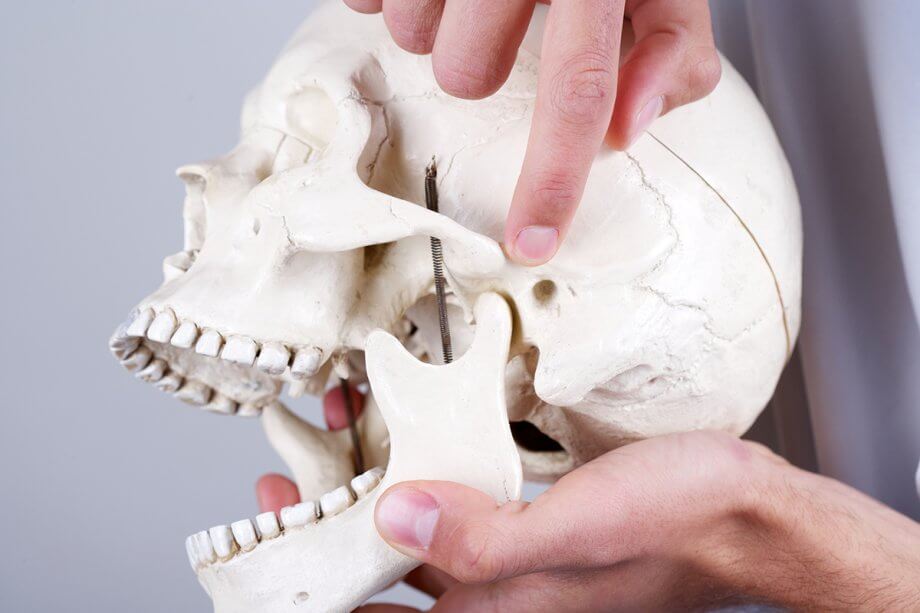TMJ disorder is a condition affecting the temporomandibular joint, the place where the lower jaw connects to the skull. It is characterized by a variety of symptoms, the most common being pain and limited range of motion in the jaw. If you have these or other symptoms you may think you have TMJ disorder. But how do you know if you have that or something else? Look for these signs and symptoms to help determine the source of the problem.
Common Symptoms of TMJ Disorder
The most common symptoms of TMJ disorder include:
- Pain. You may have pain in your jaw, especially in the area of the temporomandibular joint. You can locate the joint by putting your fingers in front of your ears and opening and closing your mouth a few times. You should be able to feel movement under the skin where the TMJ is located. If the pain is concentrated in this area, you most likely have TMJ disorder.
- Headaches. If you get frequent or persistent headaches, especially in the temple region of your head, it may be due to TMJ disorder. However, headaches can occur due to a variety of causes, so this alone may not be a strong indicator.
- Limited movement. Do you feel as if you can’t open your mouth as widely as you should be able to, or as you could in the past? If you find it difficult to open your mouth wide enough to bite into a sandwich or burger, you are experiencing limited range of motion in your jaw. In extreme cases of TMJ disorder, you may be unable to open your mouth at all.
- Popping or clicking sound. When you open and close your mouth or chew, do you hear a popping or clicking sound? This is an indication that TMJ disorder is present. The popping or clicking sound can be caused by tendons or ligaments sliding over the bones or cartilage in your TMJ.
- Muscle tenderness. The muscles in your cheeks and jaw area may become sore or tense due to overuse or misalignment of the TMJ. This may also occur due to other reasons, such as laughing or smiling more than usual. This symptom alone may not indicate TMJ disorder, but if it is combined with other symptoms it can be an important diagnostic element.
- Difficulty chewing. If TMJ disorder is present you may have a difficult time chewing food. You may have pain when you try to chew anything hard or particularly chewy. But the pain would be in the area of the TMJ, not in the teeth or gums.
- Ear pain. A less common symptom of TMJ disorder is pain in the ears. Since the TMJ is so close to the ear canal, the pain will often feel like an earache even though it is not the ears that are the problem. It is common to think you have an ear infection when you actually have TMJ disorder.
Symptoms That Are Not From TMJ Disorder
The following symptoms are often mistaken for TMJ disorder:
- Toothache. An ache deep inside a tooth is usually an indication of an infected tooth, not TMJ disorder. But a toothache can often cause the face to swell, which can make it seem as if the problem is in the jaw.
- Tender gums. Pain in the gums is more likely due to gum disease than TMJ disorder.
- Sharp, shocking pain. If you feel a sharp pain in the temple or cheek that is almost like an electric shock, you may be suffering from Trigeminal Neuralgia, a nerve disorder. You would typically only feel nerve pain in one side of the face, whereas for TMJ disorder you would feel it on both sides.
- Migraines or tension headaches. Migraine headaches are different from the type of headaches caused by TMJ disorder, in that they often include extreme sensitivity to light and sound, nausea, and other more severe symptoms. Tension headaches tend to start in the back of the neck or head. TMJ pain is typically concentrated in the temple region.
- Sinus pain. Pain under or behind the eyes or in the front part of the forehead is more likely caused by sinus congestion than TMJ disorder. If you’ve had a cold or allergies, you are most likely experiencing sinus issues.
- Extreme muscle tension. If the muscles in your neck and jaw tense up extremely, you may be experiencing tetanus. Seek medical attention immediately, especially if you’ve had a recent injury that broke the skin.
San Francisco Dental Wellness Provides Diagnosis and Treatment for TMJ
The best way to determine whether or not you have TMJ disorder is to have a professional diagnosis by a dentist. Dr Chui currently is the clinical director at the San Francisco VA Medical Center treating primarily TMJ and Sleep Apnea issues. He has over 20 years of experience treating patients with TMJ.
At San Francisco Dental Wellness we specialize in the diagnosis and treatment of TMJ disorder. We use high-quality custom-made night guards for occlusal splint therapy, which relaxes your jaw muscles and prevents bruxism (teeth grinding) while you sleep. This will help relieve the symptoms of TMJ disorder and restore range of motion in your jaw.
Call 415-781-1944 or contact us today to learn more and schedule an appointment.

